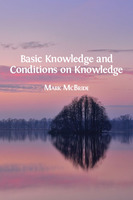Basic Knowledge and Conditions on Knowledge
| dc.contributor.author | McBride, Mark | |
| dc.date.accessioned | 2018-01-16 23:55 | |
| dc.date.accessioned | 2017-12-01 23:55:55 | |
| dc.date.accessioned | 2018-01-16 00:00:00 | |
| dc.date.accessioned | 2020-04-01T13:14:54Z | |
| dc.date.available | 2020-04-01T13:14:54Z | |
| dc.date.issued | 2017 | |
| dc.identifier | 641856 | |
| dc.identifier | OCN: 1014200322 | en_US |
| dc.identifier.uri | http://library.oapen.org/handle/20.500.12657/30832 | |
| dc.description.abstract | "How do we know what we know? In this stimulating and rigorous book, Mark McBride explores two sets of issues in contemporary epistemology: the problems that warrant transmission poses for the category of basic knowledge; and the status of conclusive reasons, sensitivity, and safety as conditions that are necessary for knowledge. To have basic knowledge is to know (have justification for) some proposition immediately, i.e., knowledge (justification) that doesn’t depend on justification for any other proposition. This book considers several puzzles that arise when you take seriously the possibility that we can have basic knowledge. McBride’s analysis draws together two vital strands in contemporary epistemology that are usually treated in isolation from each other. Additionally, its innovative arguments include a new application of the safety condition to the law. This book will be of interest to epistemologists―both professionals and students. " | |
| dc.language | English | |
| dc.subject.classification | thema EDItEUR::C Language and Linguistics::CF Linguistics::CFA Philosophy of language | en_US |
| dc.subject.classification | thema EDItEUR::G Reference, Information and Interdisciplinary subjects::GT Interdisciplinary studies::GTK Cognitive studies | en_US |
| dc.subject.classification | thema EDItEUR::Q Philosophy and Religion::QD Philosophy::QDT Topics in philosophy::QDTK Philosophy: epistemology and theory of knowledge | en_US |
| dc.subject.other | justifications | |
| dc.subject.other | safety condition | |
| dc.subject.other | sensitivity | |
| dc.subject.other | basic knowledge | |
| dc.subject.other | epistemology | |
| dc.subject.other | conclusive reasons | |
| dc.subject.other | Brain in a vat | |
| dc.subject.other | Coherentism | |
| dc.subject.other | Dogma | |
| dc.subject.other | Fallibilism | |
| dc.subject.other | Foundationalism | |
| dc.subject.other | Fred Dretske | |
| dc.subject.other | Inference | |
| dc.subject.other | Logical consequence | |
| dc.subject.other | Robert Nozick | |
| dc.title | Basic Knowledge and Conditions on Knowledge | |
| dc.type | book | |
| oapen.identifier.doi | 10.11647/OBP.0104 | |
| oapen.relation.isPublishedBy | 23117811-c361-47b4-8b76-2c9b160c9a8b | |
| oapen.relation.isbn | 9781783742837 | |
| oapen.collection | ScholarLed | |
| oapen.pages | 238 | |
| oapen.remark.public | Relevant Wikipedia pages: Brain in a vat - https://en.wikipedia.org/wiki/Brain_in_a_vat; Coherentism - https://en.wikipedia.org/wiki/Coherentism; Dogma - https://en.wikipedia.org/wiki/Dogma; Epistemology - https://en.wikipedia.org/wiki/Epistemology; Fallibilism - https://en.wikipedia.org/wiki/Fallibilism; Foundationalism - https://en.wikipedia.org/wiki/Foundationalism; Fred Dretske - https://en.wikipedia.org/wiki/Fred_Dretske; Inference - https://en.wikipedia.org/wiki/Inference; Logical consequence - https://en.wikipedia.org/wiki/Logical_consequence; Robert Nozick - https://en.wikipedia.org/wiki/Robert_Nozick | |
| oapen.identifier.ocn | 1014200322 |

